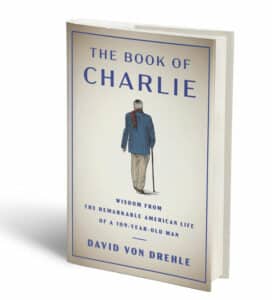Two of the bestsellers on the current New York Times non-fiction list are about how to live a long and healthy life, and if you’re lucky, die from “the old person’s friend’’ — a short bout of pneumonia.
But they are markedly different in tone and content: Dr. Peter Attia’s “Outlive,” which I recently reviewed, explains why we get sick and how we can avoid illness. Dr. Attia is a medical doctor and he writes crisply but with deep medical emphasis.
“The Book of Charlie’’ is about Dr. Charles Herbert White, a medical doctor who lived until 109 (he died on his birthday, Aug. 17, 2014). Dr. White was born in 1905 and spent most of his life in Kansas City, Missouri. He was adventurous, resilient and fortunate. For most of his adult life, he smoked, with no ill effects.
 When Charlie was just 9, his father died in an elevator accident, leaving him to become the man of the house overnight. At 17, he rode the rails with a friend, from California back to the Midwest. In his 20s, he tried to save a Kansas City gangster by transfusing his own blood to the man. Charlie had two failed marriages, career reversals while serving in the U.S. Army Air Forces, and the sudden need to revamp his medical career from a generalist specializing in “bedside manner’’ to chief of anesthesiology in a large Kansas hospital.
When Charlie was just 9, his father died in an elevator accident, leaving him to become the man of the house overnight. At 17, he rode the rails with a friend, from California back to the Midwest. In his 20s, he tried to save a Kansas City gangster by transfusing his own blood to the man. Charlie had two failed marriages, career reversals while serving in the U.S. Army Air Forces, and the sudden need to revamp his medical career from a generalist specializing in “bedside manner’’ to chief of anesthesiology in a large Kansas hospital.
Just luck?
Washington Post journalist David Von Drehle, Charlie’s neighbor, friend and confidante, wrote “The Book of Charlie’’ as a means of inspiring his children to see life beyond the confines of the digital world. Starting out on the book, he figured Charlie would impart grand nuggets of wisdom on how to live a long, mostly happy, usually interesting and just plain enjoyable life.
“Everywhere Charlie went he was asked for his secret to longevity. His answer was deflating. It was just luck, he said. His genome, over which he had no influence, had not betrayed him with a weak heart or a wasting disease.
“Luck.’’
So, if there was no magical medical answer to the question of Charlie’s longevity, where did that leave Von Drehle? With a book about philosophy and attitude: Charlie, largely undaunted by setbacks, was willing to try new things rather than recoil from the monumental changes and upheaval taking place in the world during his lifetime.
A world of possibilities
Anecdotes flourish about Charlie’s resilience and resourcefulness, and his physical prowess: Von Drehle first sees Charlie in 2007, at 102, washing his girlfriend’s car in a Kansas City heat wave. His girlfriend, the last of the women in his life, was about 82 and the mother of Oscar-winning actor Chris Cooper.
She shared with Charlie’s mother a “light touch’’ in raising her children, which Von Drehle figures helped Charlie see the world’s possibilities, not its limitations.
But, Von Drehle says, the pivotal moment that shaped Charlie’s mettle was his father’s accidental death. “Suffering a loss so enormous, and surviving it, Charlie decided he could get through anything. He began reaching for the things he could control: his own actions, his own emotions, his own outlook, his own grit.’’
Von Drehle sees that child becoming as “independent as Huckleberry Finn, as resourceful as the Artful Dodger.’’ There’s also a bit of Forrest Gump in the Charlie story, in his Gump-like ability to take on whatever came his way and then thrive in the new undertaking.
The real deal
After Charlie died, his family found a single sheet of notepaper containing his philosophy, expressed in brief “definitive commands,’’ says Von Drehle. Truth to tell, they sound like a card from Hallmark, which was founded by Joyce C. Hall in Charlie’s hometown of Kansas City, when Charlie was 5. These “definitive commands’’ include “Think freely. Make some mistakes. Learn from them. Work hard. Take a chance. Enjoy wonder.’’
“The Book of Charlie. Wisdom From the Remarkable American Life of a 109-Year-old Man,’’ by David Von Drehle. Simon & Schuster. $26.00.
In a four-decade career in journalism, Eleanor O’Sullivan has reviewed many books on best practices for financial advisors, has written for Financial Advisor and the USA Today network, and was the movie critic for the Asbury Park Press.







